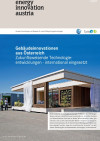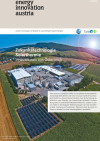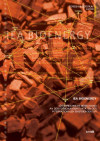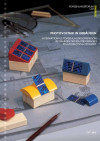Suchergebnisse für "Factsheet: Energietechnologien gestalten, die für alle sinnvoll und nutzbar sind"
IEA SHC Task 68 Peer-reviewed Journal Paper 2023: Fault detective - Automatic fault-detection for solar thermal systems based on artificial intelligence

In diesen Open-Access Paper wird ein Algorithmus zur automatischen Fehlerdetektion vorgestellt, der an drei solarthermischen Großanlagen getestet wurde.
Feierl L, Unterberger V, Rossi C, Gerardts B, Gaetani M
Herausgeber: SOLID Solar Energy Systems GmbH, 2023
Englisch, 17 Seiten
IEA EBC Annex 63: Implementation of Energy Strategies in Communities
Im IEA EBC Annex 63 wurden zwei neue Berichte veröffentlicht: "Application of Strategic Measures" sowie "Stakeholder Support Materials".
IEA Bioenergy Task 39: Drop-in Biofuels – The key role that co-processing will play in its production (2019)

Der Bericht beschäftigt sich mit der Schlüsselrolle der Co-Verarbeitung von Drop-In-Biokraftstoffen in der Raffinerie.
Susan van Dyk, Jianping Su, James D. McMillan, Jack (John) N. Saddler
Herausgeber: IEA Bioenergy Task 39, 2019
Englisch, 156 bzw. 12 Seiten
Downloads zur Publikation
Highlights of Bioenergy Research 2020
January 24th, 2020
Messe Congress Graz, Messeplatz 1, 8010 Graz
National and international results from the IEA Bioenergy Tasks and the ERA-NET Bioenergy
Aktuelle Publikationen des IEA-SHC Tasks 49
Aktuelle Publikationen zum Thema "Solare Prozesswärme" jetzt online verfügbar.
Call for Papers – BauZ! Kongress 2023
Der nächste BauZ! Kongress am 7. und 8. März 2023 steht unter dem Thema der Knappheit. Das IBO lädt ein, Beiträge in Form einer Präsentation eines Bauvorhabens, einer Produktentwicklung oder einer (abgeschlossenen) Forschungsarbeit bis 30. November 2022 einzureichen.
Nachlese Expertenforum "Energiespeicher Beton"
Das Expertenforum fand am 2. März in Schlierbach und am 3. März 2015 in Eisenstadt statt. Im Zentrum stand das Thema "Visionäres Energiemanagement - von der Forschung zur Umsetzung", eine intensive Auseinandersetzung erfolgte mit der gebauten Infrastruktur als Energiespeicher.
Environmental, Material Flow and Sustainability Management Accounting - Offensive diffusion in adult education
Diffusion of the "Factory of Tomorrow" project line on environmental and material flow cost accounting (EMA and MFCA) for corporate and national system boundaries, as well as related tools for sustainability accounting in existing post graduate studies.
Strategic optimisation of the regulation of air moisture through ventilation systems to reduce energy demand for humidifiers and dehumidifiers
For the validation of coupled room and building component simulations, an analytical solution of this unsteady problem was developed. Finally, a simplified method for determining the humidification and dehumidification demands considering a room's effective moisture capacity was developed.
Ausschreibung Eco-Innovation
SCI_BIM - Scanning and data capturing for Integrated Resources and Energy Assessment using Building Information Modelling
The aim of the project is to increase the resources- and energy efficiency through coupling of various digital technologies and methods for data capturing (geometry and materials composition) and modelling (as-built BIM), as well as through gamification.
Gebäudeinnovationen aus Österreich

Zukunftsweisende Technologieentwicklungen - international eingesetzt
energy innovation austria
1/2017
Herausgeber: BMVIT und Klima- und Energiefonds
Deutsch, 8 Seiten
Downloads zur Publikation
Zukunftstechnologie Solarthermie

Zukunftstechnologie Solarthermie - Innovationen aus Österreich
energy innovation austria
1/2016
Herausgeber: BMVIT und Klima- und Energiefonds
Deutsch, 8 Seiten
Downloads zur Publikation
IEA EBC Annex 63 publiziert drei neue Berichte
Im IEA EBC Annex 63 "Umsetzung von Energiestrategien in Gemeinden" wurden 2017 drei Berichte publiziert.
Rückblick: IEA Vernetzungsworkshop 2011
Am 9ten März fand der jährliche Vernetzungsworkshop der nationalen Akteure innerhalb der IEA-Forschungskooperation statt. Mit ca. 50 TeilnehmerInnen war der Workshop ein voller Erfolg und bot den Anwesenden einen umfassenden Überblick über aktuelle Themen der Internationalen Energieagentur (IEA).
Ausschreibung: Einreichung von Demonstrationsprojekten
Bis 19. November 2010 können - in Ergänzung zur 2. Ausschreibung von "Haus der Zukunft Plus" - Projektanträge zu Plus-Energie-Gebäuden mit hoher Signal- und Multiplikationswirkung als Demonstrationsprojekte eingereicht werden.
Preisverleihung des Wettbewerbs "Intelligente Anwendungen Nachwachsender Rohstoffe"
6. May 2003
Tech Gate Vienna, Konferenzsaal, Ebene 0 / Gate 3
Wien, AT
Preisverleihung des Wettbewerbs im Rahmen der Programmlinie "Fabrik der Zukunft" durch Herrn Bundesminister Hubert Gorbach
IEA Bioenergy

Österreichische Beteiligung an den Forschungsaktivitäten der internationalen Energieagentur
Forschungsforum
4/2000
Herausgeber: BMVIT
Deutsch, 6 Seiten
Downloads zur Publikation
ModularHeatNet
The aim of the project is to support Ottensheim in phasing out fossil fuels and developing a "climate-neutral" heat supply. As a result, the community will receive a solid decision-making basis based on the technical, economic, organizational, and environmental comparison of the examined heat supply approaches.
Photovoltaik In Gebäuden

Internationale Forschungskooperation im Rahmen des IEA-Programms "SOLAR HEATING & COOLING"
Forschungsforum
1/1997
Herausgeber: BMVIT
Deutsch, 6 Seiten
